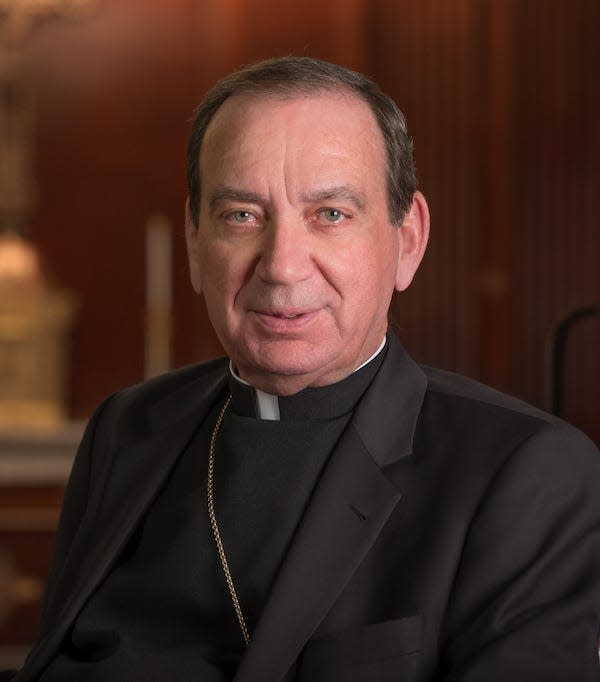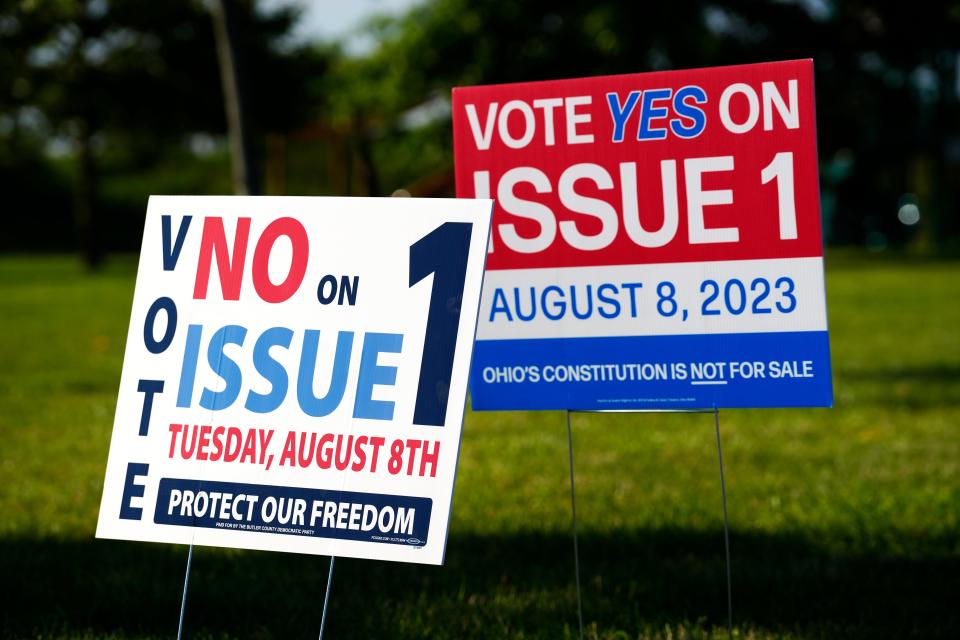Cincinnati's Catholic archbishop enters abortion amendment fight, calls it 'extreme'
- Oops!Something went wrong.Please try again later.
Cincinnati Archbishop Dennis Schnurr waded into Ohio’s political fight over a proposed constitutional amendment guaranteeing abortion rights with a letter Saturday urging Catholics to reject it as extreme and dangerous.
Schnurr’s “letter to the faithful” signals the Catholic Church will be directly engaged in a political campaign in ways it rarely has been in the past.
“Some may insist that the Catholic Church should not be involved in politics,” Schnurr wrote. “However, the defense of life and care for women compels our participation in this critical moral issue.”

Tax-exempt religious organizations, such as the church, are barred from directly campaigning for political candidates, but federal law allows them to participate in campaigns for or against ballot measures like the one Ohio voters will decide on Nov. 7.
The Catholic Church always has opposed abortion as an “intrinsic evil” that violates church teaching. Bishops and priests have preached for years against abortion and have supported Catholic-led advocacy groups such as Right to Life.
But the U.S. Supreme Court decision last year overturning the constitutional right to abortion created a new political dynamic that has opened the door to greater involvement by the church.
Church 'must not remain on sidelines'
The court’s ruling threw the issue to the states, allowing lawmakers in every state to permit or limit abortion as they see fit. When many states, including Ohio, proposed or enacted severe restrictions on abortion, citizens who support abortion rights pursued statewide ballot measures that would guarantee those rights.
That’s what happened in Ohio, when advocates for abortion rights gathered more than 400,000 signatures to put the question directly to voters in November.
If Ohio voters approve it, the measure would enshrine the right to obtain an abortion in the state constitution and would limit the state’s ability to restrict that right until after the fetus is viable, which generally occurs sometime after 20 weeks.
The proposed amendment states that “every individual has a right to make and carry out one’s own reproductive decisions, including but not limited to decisions on contraception, fertility treatment, continuing one’s own pregnancy, miscarriage care, and abortion.”
Schnurr argued in his letter that the law’s “vague language” with regard to parental consent when minors seek abortions would open the door to teens acting without consultation with parents.
He also suggested the law would allow abortions through nine months of pregnancy. Though the proposed amendment only guarantees a right to abortion until fetal viability, it does allow exceptions if physicians determine a woman’s life or health is in danger.
“The Church must not remain on the sidelines when confronted with such a clear threat to human life and dignity and the primacy of the family,” Schnurr wrote.
He said the proposed amendment would guarantee “the ‘right’ to take the lives of innocent children in the womb while harming women and families in the process.”
"I urge Catholics and all people of goodwill to pray earnestly for the defeat of this extreme amendment," Schnurr wrote.
Poll shows support for the amendment
The archbishop’s letter comes days after Ohio voters soundly rejected Issue 1, a proposed amendment to require voter approval of 60% for any change to the state constitution, instead of the 50% plus one that’s been required for more than a century.
Issue 1 was not technically about abortion, but it was backed by Republicans seeking to derail the abortion rights amendment on the ballot in November.

Abortion rights advocates said the rejection of Issue 1 shows Ohio voters support allowing access to abortion, not restricting it. “Ohioans saw Issue 1 for what it was – an attempt to deny our families a voice, even when it comes to our most personal decisions,” said Rhiannon Carnes, a spokeswoman for Ohioans United for Reproductive Rights, after voters defeated Issue 1 on Tuesday.
Supporters of Ohio's proposed constitutional amendment say it's necessary to keep politics and religious extremism from stripping away Ohioans' rights and endangering their health. Without it, they argue, Ohio's Republican-dominated statehouse would impose severe restrictions.
Current Ohio law allows abortion until fetal viability. But another law, often referred to as “the heartbeat bill,” would essentially ban abortion after six weeks. That law has been approved by the state legislature and signed by Gov. Mike DeWine, but it is on hold pending a legal challenge that’s now before the Ohio Supreme Court.
Polls show support, both nationally and in Ohio, for keeping abortion legal in at least some cases. Even in Republican-led states such as Kentucky and Kansas, voters in the past year have backed abortion rights in statewide ballot measures.
A USA TODAY Network Ohio/Suffolk University poll in July found that 58% of Ohio voters support the constitutional amendment on the ballot in November.
"Ohioans believe that abortion is a personal, private decision that should be up to them and their families without government meddling in their business," Carnes said.
This article originally appeared on Cincinnati Enquirer: Cincinnati Catholic archbishop enters political fight over abortion

